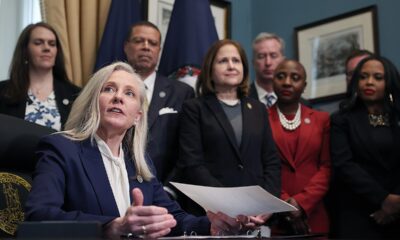Vermont
‘Utterly terrifying’: Vt. school superintendent says he was interrogated for hours upon return from Nicaragua – The Boston Globe
The superintendent of a Vermont public school system says federal authorities detained and interrogated him for hours at a Houston airport this week after returning to the US from Nicaragua.
Wilmer Chavarría, 36, said he was whisked away by federal Customs and Border Protection agents Monday evening while attempting to use the Global Entry program at George Bush Intercontinental Airport. He was eventually separated from his husband and questioned for four to five hours in what he described as a “bizarre” and “traumatizing” experience.
During the encounter, Chavarría said, agents made homophobic remarks, threatened him and denied him access to an attorney.
“I don’t wish this on anybody,” he said. “It’s utterly terrifying, as a US citizen, to be told you have no rights and you should stop talking about your rights.”
A spokesperson for Customs and Border Protection did not respond to a request for comment Thursday. Chavarría’s detention was first reported by Seven Days, a Burlington newspaper.
Chavarría was born in a refugee camp on the border of Honduras and Nicaragua during the Nicaraguan Revolution. After completing high school in Canada, he moved to the US for college in 2008 and attained his citizenship a decade later. He remains a dual citizen of Nicaragua.
A former teacher and principal, Chavarría has served for two years as superintendent of schools in Winooski, just outside of Burlington. The most diverse school district in the state, it drew notice earlier this year when it adopted a “sanctuary school” policy seeking to prevent federal authorities from using school resources to enforce immigration laws.
Chavarría’s own family has firsthand experience with President Donald Trump’s immigration crackdown. His brother, sister-in-law and two nieces chose to “self-deport” from Vermont to Nicaragua earlier this year after losing temporary immigration protections. The local high school held an early graduation ceremony for the nieces prior to their departure.
During Chavarría’s detention this week, he said, agents appeared focused on inspecting his electronic devices, including a personal cell phone and a district-issued tablet and laptop. Chavarría said he repeatedly made clear that the agents were welcome to search his personal files but not those pertaining to the district, citing student confidentiality laws. He ultimately allowed them to inspect the devices, once they promised not to access work-related files.
At various points during the questioning, Chavarría said, agents appeared skeptical that he was a school superintendent and that he was married to his husband, Cyrus Dudgeon.
“I don’t know how many married couples have to prove to the United States government that they are real,” Chavarría said.
The two were kept apart as agents questioned Chavarría.
“It felt frightening not knowing what was happening to Wilmer,” Dudgeon said.
Chavarría was eventually released without any explanation as to why he had been detained. He and Dudgeon missed their connecting flight. The next day, Chavarría received notice that he had been terminated from the Global Entry program. He said he expects to visit family in Nicaragua again but is “terrified of doing so.”
Nicole Mace, vice president of the Winooski School Board, said she was “outraged” by Chavarría’s treatment.
“I don’t recognize this country anymore,” she said. “What is happening? It’s horrifying.”

Vermont
Spaulding wrestling dethrones Mount Anthony, ends 36-year title reign
Editor’s note: For the full championship story and photos, visit HERE.
HINESBURG — For the first time since 1988, there is a new Vermont high school wrestling state champion.
Spaulding dethroned Mount Anthony, ending the Patriots’ 36-year reign with an impressive team performance at the state championship at Champlain Valley Union High School on Feb, 28, 2026.
The Crimson Tide scored grapplers in 12 out of 14 weight classes and had seven of them competing in final matches.
Spaulding, which locked up the title before final matches commenced, finished with 236.5 points to MAU’s 195.
This is Spaulding’s first title since 1984. MAU’s unchallenged championship run was a national record for wrestling. It ranks sixth all-time for consecutive state titles among all high school sports in the country.
Check back later for an updated story and photo gallery at burlingtonfreepress.com.
Team scores (final)
1. Spaulding 236; 2. Mount Anthony 195; 3. Middlebury 134.5; 4. Vergennes 123; 5. Otter Valley 121; 6. Colchester 96; 7. Essex 86; 8. Mount Abraham 85.5; 9. Harwood 67; 10. Springfield 54; 11. Fair Haven 52; 12. Mount Mansfield 44; 13. Burr and Burton 43; 14. North Country 38.5; 15. Mill River 38; 16. St. Johnsbury 37.5; 17. Champlain Valley 36; 18. Lyndon 33; 19. South Burlington 29; 20. Randolph 28; 21. Rutland 26; 22. U-32 12; 23. Lamoille 11; 24. Lake Region 6; T25. BFA-Fairfax, Rice 3.
106-pound final: Wesley Churchill (Spa) def. Fernando Oyola (MAU) for 14-3 win (major decision)
Winner: Churchill caps the evening of finals with with a state title as the No. 3 seed, beating the top-ranked grappler in this division. Churchill was fifth a year ago at 106.
Other place finishers: 3. Tolkein Lawlor (MMU); 4. Brady Babcock (OV); 5. Mason Douglass (U-32); 6. Sam Dyer (Rut).
113-pound final: Sylas Race (MAU) def. Lucas Colby (Spa) for 8-7 win
Winner: In the first match of the finals, Race builds a 7-0 lead before Colby storms back in the final period. But Race holds on for the 8-7 victory. The match was stopped three times for what appeared to be a bloody nose.
Other place finishers: 3. Caleb Woodward (OV); 4. Addie Smith (Verg); 5. Colton Jones (MR); 6. Liem Moller (CVU).
120-pound final: Brayden Buchanan (Essex) def. Mason Sheltra (Col) for 16-1 win (tech fall)
Winner: The sophomore Buchanan polishes off his second straight title, securing a tech fall (margin of 15 or more points) in the final seconds of the match. Buchanan celebrates with a back flip. Sheltra was going for a third state title.
Other place finishers: 3. Miles Goetz (Midd); 4. Duncan Klinck (Har); 5. Vincent Deysenroth (MAU); 6. Darien Haselton (CVU).
126-pound final: Cahota LaFond (Col) def. Eion Comes (NC) for 17-0 win (tech fall)
Winner: LaFond completes a fourth straight state title with a tech fall in the final seconds of the first period. The senior, who surpassed 200 career wins last month, celebrates with a take down to the mat of his coach, Scott McPhearson.
Other place finishers: 3. Jackson Brown (MMU); 4. Adrien Provencher (Verg); 5. Grady Thurston (Spa); 6. Eric Whitten (Har).
132-pound final: Stephen Kittredge (Verg) def. Anthony Szabo (FH) for 7-4 overtime win
Winner: In the early moments of a 1-minute overtime period, Kittredge uncorks impressive takedown for the three points and state title, his first after finishing runner-up at 126 in 2025.
Other place finishers: 3. Dylan Jacobs (Col); 4. Landon Wilcox (OV); 5. Nate Sackett (Har); 6. Cole Brown (Lyn).
138-pound final: Asa Reis (MAU) def. Karter Morey (Lyn) for 17-4 win (major decision)
Winner: Reis seizes his second title in three years, taking early lead and cruising to the major decision. A year ago, Reis was runner-up in this weight class.
Other place finishers: 3. Colby Belden (FH); 4. Mo Hussein (SB); 5. Camden Ayer (CVU); 6. Gavin Winnie (Spa).
144-pound final: Duncan Harrington (MAU) def. Michael Grasso (Spa) for 10-3 win
Winner: Harrington gets his third straight state crown. Harrington scored a pair of takedowns in the first period to take control.
Other place finishers: 3. Jackson Scribner (Verg); 4. Anthony Abetti (BBA); 5. Carter Jones (Essex); 6. Wyatt Tarbell (MR).
150-pound final: Isayah Isham (MTA) pins Tyler Monick (MAU)
Winner: With 17 seconds left in the second period, Isham pins Monick for his state title. Isham, who took third a year ago, was up 10-1 prior to his pin.
Other place finishers: 3. James Marcellus (Spa); 4. Jackson Ladd (SJ); 5. Micah Perez (Rut); 6. Chase Tefts-Young (Col).
157-pound final: Nicky Service (Har) def. Mason Atkins (MTA) for 9-7 win
Winner: Service is the first Harwood wrestler to win a state title since Kyle Streeter in 2013.
Other place finishers: 3. Logan Slater (Spa); 4. Connor Decker (SJ); 5. Jason Sperry (Midd); 6. Jeremy Glodgett (NC).
165-pound final: Noah Dunster (Spa) def. Blake Allen (OV) for 4-3 win
Winner: Dunster scored all of his points (escape, takedown) in the first period, hanging on to beat the top seed for his first state title.
Other place finishers: 3. Dimitri Jasinski (Spring); 4. Lincoln Painter (MTA); 5. Quinn Veth-McGovern (BBA); 6. Henry Dodge (SB).
175-pound final: Payton Lavoie (Verg) pins Caleb Hoar (Spa)
Winner: Lavoie earns his second straight crown with a first-period pin with 22 seconds left. Last year, Lavoie won the 190-pound class.
Other place finishers: 3. Ethan Patch (MR); 4. Parker Carl (Midd); 5. Jonathan Lake (Spring); 6. Max Potter (OV).
190-pound final: Maxwell LaPerle (Spa) def. Wyatt Kennett (Midd) for 20-2 win (tech fall)
Winner: After a scoreless first period, LaPerle led 5-1 through two periods before piling up two near falls and two takedowns for the tech fall victory.
Other place finishers: 3. Zane Cooper (Rand); 4. Keegan Reid (OV); 5. Abraham Kreuger (Lam); 6. Jacob Jamieson (FH).
215-pound final: Tucker Wright (Midd) pins Charlie Berry (Spa) (5:49)
Winner: Wright separates with an eight-point second period and then secures second consecutive state title with a late third-period pin.
Other place finishers: 3. Drake Felkl (OV); 4. Ian Denue (MAU); 5. Rowan Danaher (Essex); 6. Dallas Sulton’El (Col).
285-pound final: Ryan Marsden (MAU) pins Steven Lackard (Midd) (4:37)
Winner: Marsden claims his third straight 285-pound championship with a third-period pin.
Other place finishers: 3. Joe Gershon (Essex); 4. Izaak Wolniewicz (Verg); 5. Tyler Scott (MMU); 6. Alex Poczobut (Spa).
Contact Alex Abrami at aabrami@freepressmedia.com. Follow him on X, formerly known as Twitter: @aabrami5.
Vermont
Ugandan torture survivor and UVM Health Network nurse faces uncertain future in Vermont

BURLINGTON, Vt. (WCAX) – We’re digging deeper into the story of Steven Tendo, an asylum seeker living in Vermont who was detained by ICE, but has been released. We spoke with his lawyer about his plan to stay in the states amidst the national immigration crackdown.
Stephen Tendo was a political activist in Uganda. He fled after he was tortured, shot in the leg, and lost two of his fingers. He sought asylum at a port of entry in Brownsville, Texas, in 2018.
In 2019, the Department of Homeland Security denied his application, and Tendo was detained for two and a half years.
The Department of Homeland Security says they denied his application for asylum because of inconsistencies.
“They had to do with his wife’s date of birth, as well as his prior visa application, which asked for all the countries that he traveled through,” said Christopher Worth, Tendo’s lawyer.
A non-profit research group found 69% of asylum applications were denied in 2019 during Trump’s first term. Tendo was released on an order of supervision in 2021, which means he could live and work in the U.S. while awaiting potential removal. Since then, he’s been a pastor and a nursing assistant in Vermont.
“Steven filed three applications for stays of removal, all of which were granted. He was scheduled for a check-in on Friday, February 6th. ICE had been notified that that’s when the stay application was being filed, but yet they took that day as the opportunity to arrest him two days before his check-in,” said Worth.
Tendo spoke with Senator Peter Welch about the conditions of the Dover detention center.
“The circumstances he described in Dover were really — very, very bad,” said Senator Welch.
A New Hampshire judge found ICE violated Tendo’s due process because the federal agency did not provide the required notice for revoking his supervised release. Tendo, who has no criminal record, walked free on February 20th.
“The pattern that we’re seeing is that ICE seems to have a quota for arrests. I’ve heard that they have to make 3,000 arrests every day, and that’s very hard to do. And so, ICE seems to be arresting everyone they possibly can, whether or not that person may be removed or not,” said Worth.
Tendo is expected to check in with ICE on March 20th at their St. Albans office. While his attorneys are hard at work trying to delay his potential removal, it’s unclear if he will be detained again before then.
Copyright 2026 WCAX. All rights reserved.
Vermont
VT Lottery Mega Millions, Gimme 5 results for Feb. 27, 2026
Powerball, Mega Millions jackpots: What to know in case you win
Here’s what to know in case you win the Powerball or Mega Millions jackpot.
Just the FAQs, USA TODAY
The Vermont Lottery offers several draw games for those willing to make a bet to win big.
Those who want to play can enter the MegaBucks and Lucky for Life games as well as the national Powerball and Mega Millions games. Vermont also partners with New Hampshire and Maine for the Tri-State Lottery, which includes the Mega Bucks, Gimme 5 as well as the Pick 3 and Pick 4.
Drawings are held at regular days and times, check the end of this story to see the schedule.
Here’s a look at Feb. 27, 2026, results for each game:
Winning Vermont Mega Millions numbers from Feb. 27 drawing
11-18-39-43-67, Mega Ball: 23
Check Vermont Mega Millions payouts and previous drawings here.
Winning Gimme 5 numbers from Feb. 27 drawing
03-22-25-35-37
Check Gimme 5 payouts and previous drawings here.
Winning Pick 3 numbers from Feb. 27 drawing
Day: 8-7-9
Evening: 5-3-8
Check Pick 3 payouts and previous drawings here.
Winning Pick 4 numbers from Feb. 27 drawing
Day: 3-4-6-6
Evening: 8-5-3-3
Check Pick 4 payouts and previous drawings here.
Winning Millionaire for Life numbers from Feb. 27 drawing
03-04-13-28-42, Bonus: 02
Check Millionaire for Life payouts and previous drawings here.
Feeling lucky? Explore the latest lottery news & results
Are you a winner? Here’s how to claim your lottery prize
For Vermont Lottery prizes up to $499, winners can claim their prize at any authorized Vermont Lottery retailer or at the Vermont Lottery Headquarters by presenting the signed winning ticket for validation. Prizes between $500 and $5,000 can be claimed at any M&T Bank location in Vermont during the Vermont Lottery Office’s business hours, which are 8a.m.-4p.m. Monday through Friday, except state holidays.
For prizes over $5,000, claims must be made in person at the Vermont Lottery headquarters. In addition to signing your ticket, you will need to bring a government-issued photo ID, and a completed claim form.
All prize claims must be submitted within one year of the drawing date. For more information on prize claims or to download a Vermont Lottery Claim Form, visit the Vermont Lottery’s FAQ page or contact their customer service line at (802) 479-5686.
Vermont Lottery Headquarters
1311 US Route 302, Suite 100
Barre, VT
05641
When are the Vermont Lottery drawings held?
- Powerball: 10:59 p.m. Monday, Wednesday, and Saturday.
- Mega Millions: 11 p.m. Tuesday and Friday.
- Gimme 5: 6:55 p.m. Monday through Friday.
- Lucky for Life: 10:38 p.m. daily.
- Pick 3 Day: 1:10 p.m. daily.
- Pick 4 Day: 1:10 p.m. daily.
- Pick 3 Evening: 6:55 p.m. daily.
- Pick 4 Evening: 6:55 p.m. daily.
- Megabucks: 7:59 p.m. Monday, Wednesday and Saturday.
- Millionaire for Life: 11:15 p.m. daily
What is Vermont Lottery Second Chance?
Vermont’s 2nd Chance lottery lets players enter eligible non-winning instant scratch tickets into a drawing to win cash and/or other prizes. Players must register through the state’s official Lottery website or app. The drawings are held quarterly or are part of an additional promotion, and are done at Pollard Banknote Limited in Winnipeg, MB, Canada.
This results page was generated automatically using information from TinBu and a template written and reviewed by a Vermont editor. You can send feedback using this form.
-

 World3 days ago
World3 days agoExclusive: DeepSeek withholds latest AI model from US chipmakers including Nvidia, sources say
-

 Massachusetts4 days ago
Massachusetts4 days agoMother and daughter injured in Taunton house explosion
-

 Montana1 week ago
Montana1 week ago2026 MHSA Montana Wrestling State Championship Brackets And Results – FloWrestling
-

 Denver, CO4 days ago
Denver, CO4 days ago10 acres charred, 5 injured in Thornton grass fire, evacuation orders lifted
-

 Louisiana6 days ago
Louisiana6 days agoWildfire near Gum Swamp Road in Livingston Parish now under control; more than 200 acres burned
-

 Technology1 week ago
Technology1 week agoYouTube TV billing scam emails are hitting inboxes
-

 Technology1 week ago
Technology1 week agoStellantis is in a crisis of its own making
-

 Politics1 week ago
Politics1 week agoOpenAI didn’t contact police despite employees flagging mass shooter’s concerning chatbot interactions: REPORT



















